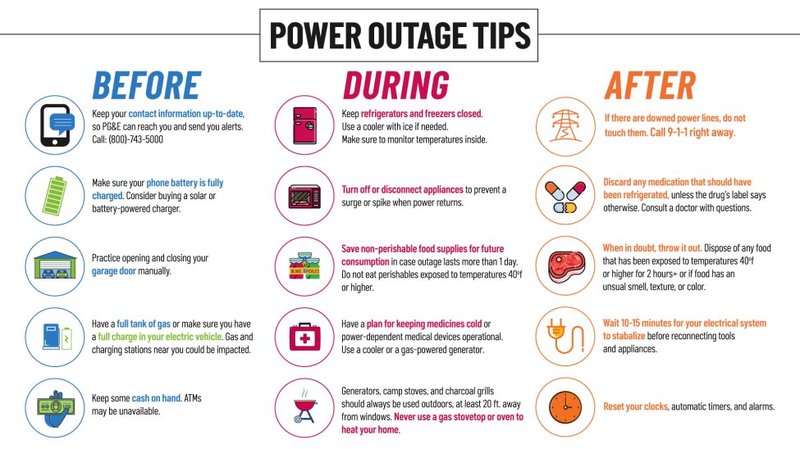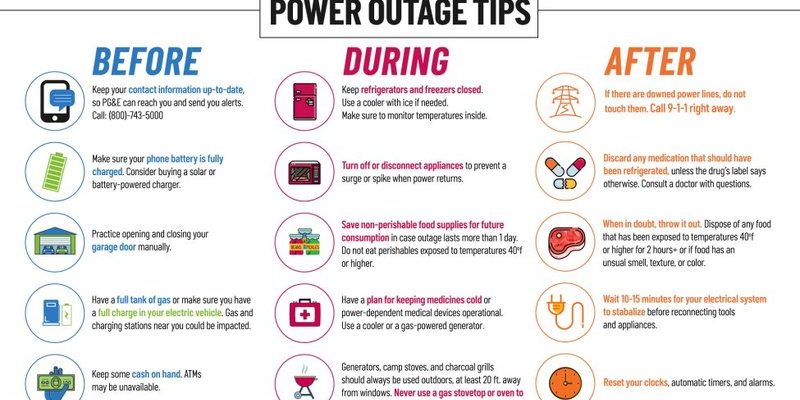
Look, nobody really *plans* for a blackout, and when one hits—whether from a wild thunderstorm or an unexpected utility hiccup—it’s easy to panic or feel helpless. But with the right mindset and a few simple steps, a power outage doesn’t have to turn your day upside down. Let me walk you through exactly what you should do, how to troubleshoot common problems, and a few little tips for staying safe and sane until the lights come back on.
Stay Calm and Check Your Surroundings
When the power blinks off, your first instinct might be to grab your phone and start texting neighbors to see if it’s “just you.” That’s actually a smart move. Honestly, before you do anything else, take a minute to stay calm and look around. Listen—can you hear hallway lights buzzing or other apartment sounds? Peer out your window onto Chestnut or Walnut Street. Are the traffic lights working? Is your building alone in the dark, or does it look like the whole neighborhood is out?
Here’s the thing: Sometimes, what feels like a full-scale power outage is actually a blown fuse or tripped breaker in just your unit. If neighboring buildings still seem bright, it’s time for a little troubleshooting in your electrical panel. If everywhere is dark, it’s likely a broader grid issue, and you can skip straight to calling it in. Don’t stress—even veteran Philadelphians have trouble telling the difference in those first panicky moments.
Another big tip: double-check your safety first. If you’re using oxygen, have a medical device, or live with someone who does, now’s the time to check batteries or backup power supplies. If you smell gas, see sparks, or hear a loud popping sound, evacuate immediately and call 911 from a safe spot.
Report the Outage to Your Utility Provider
Once you’ve confirmed it’s not just your apartment, you need to let your local utility know. In zip code 19103, that’s PECO Energy. Power companies don’t magically know when a block goes dark—they rely on calls and online reports to pinpoint outages.
- Call PECO’s emergency number: 1-800-841-4141
- Report the outage via their official website or mobile app if your phone battery allows
- Let them know if you see downed lines, sparks, or hear alarms—these details help with response times
You might be wondering, “Shouldn’t my building manager handle this?” Sometimes yes, but don’t assume someone else called it in. PECO prioritizes areas with the most reports, so one more call never hurts.
Pro tip: Keep the PECO number and your building’s maintenance contact saved in your phone—or even written down somewhere. When your battery is precious, every second counts.
Protect Your Electronics and Appliances
Here’s one of those easy-to-forget but super important steps: Unplug high-value electronics and appliances. Picture this—when the power comes back, it can surge, and that “zap” can fry gadgets like your TV, computer, or even your fancy espresso machine. Think of it like a floodgate suddenly opening after a dam has been closed; that rush is trouble for sensitive stuff.
Go around your space and pull the plugs on devices like:
- TVs and sound systems
- Desktop computers, printers, routers
- Kitchen appliances—microwaves, blenders, coffee makers
- Chargers for phones and tablets (unless you need them right now)
You can leave your fridge and freezer plugged in—just avoid opening them. They’re insulated enough to keep food safe for hours if you don’t let the cold out. For most devices, especially anything you can’t easily replace, these few seconds of prevention can save you hundreds of dollars.
Maximize Light and Conserve Battery Power
Suddenly, darkness. That’s when you get creative. If you’ve got a flashlight, lantern, or battery pack, now’s the time to dig it out. If not, candles can work in a pinch, but use them carefully—never leave a burning candle unattended, especially if you’re feeling frazzled.
Most of us instinctively grab our smartphones, but here’s why you should use screens sparingly: During a citywide power outage, your phone is your lifeline to news, updates, and maybe some morale-boosting memes. If you don’t have a backup battery, try switching your device to low-power mode and turn off Wi-Fi and Bluetooth to conserve juice.
If you’re craving a bit more light, try this old-school trick: set up a flashlight so it points into a clear jug or bottle of water. This diffuses the beam and creates a soft, room-filling glow. It’s no Christmas Village, but it beats bumping into your furniture.
Keep Yourself and Food Safe
Don’t underestimate how quickly a power outage can turn into a safety hazard, especially if it stretches into several hours. In the summer, things can get muggy and hot—no surprise in Center City. In winter, it gets chilly fast. Your first job? Keep yourself comfortable. Bundle up or shed layers as needed. If you have to go outside for fresh air or updates, be careful with steps and sidewalks—accidents are more common in the dark.
Now about your food: Try not to open the fridge or freezer unless it’s absolutely necessary. Cold air escapes fast. Normally, a fridge will keep food safely chilled for about four hours; a freezer, up to 48 hours if you don’t open it. That’s plenty of time for the pros at PECO to get things back in order. If the outage goes on longer, it might be time to break out the shelf-stable snacks—think granola bars, nuts, or classic peanut butter sandwiches.
If you use a gas stove, don’t be tempted to use it for heat. That’s not what it’s for and can quickly lead to carbon monoxide danger. Instead, pull out some blankets or have a socially distant chat in the hallway while you wait.
Stay Informed and Connected
Let’s be honest—ignorance isn’t bliss when you want to know when the lights are coming back. Even if your Wi-Fi is down, cell service in 19103 is usually decent enough for news apps or social media. Try to check:
- PECO’s outage map for updates
- Local Philadelphia news outlets on Twitter or Facebook
- Community message boards or building group chats
Radio is a surprisingly resilient option. If you have a battery-powered radio lying around (hey, it happens), tune to KYW Newsradio 1060 AM for hyperlocal updates about Center City outages and weather.
You might be tempted to wander outside for a better signal, but stick to well-lit areas. If you need to leave your building—maybe there’s a long-term outage—always let someone know where you’re going and when you expect to be back.
Plan for the Next Power Outage
Honestly, the best way to handle a power outage in zip code 19103 is to be a bit of a “future you” hero. Once the lights are back, it’s tempting to forget the whole thing, but a few small moves can save a lot of stress next time.
Start a little “power outage kit”—this can live in a shoebox or tote in your closet. Toss in:
- Flashlights and spare batteries
- USB battery packs for your devices
- Non-perishable snacks and bottled water
- A written list of emergency contacts (in case your phone dies)
- Manual can opener, basic first aid
Consider chatting with your building manager about emergency lighting in common halls or what plans are in place for long blackouts. You might also want to check if your renter’s insurance covers spoiled food or damaged electronics from power surges.
Most important—don’t beat yourself up if you felt totally unprepared this time. Everyone living in a city like Philadelphia gets caught off guard eventually. It’s all about learning and feeling a bit more in control next time.
Comparing Alternatives: Portable Power and Generators
You might be wondering, “Should I get a generator or some sort of emergency power supply for my apartment?” Here’s the deal: In most apartments and high-rises in 19103, gas-powered generators are a no-go—they’re noisy, risky, and usually against building rules. But don’t worry, there are some safer, apartment-friendly options.
- Portable power banks: Great for charging phones, tablets, even a small fan or lamp. Super useful in a pinch, easy to recharge once power returns.
- Solar-powered chargers: Philadelphia doesn’t get loads of sun in the winter, but a sunny windowsill can keep your phone going in an extended outage.
- Battery backup power stations: These are basically beefed-up versions of a regular battery bank, safe for indoors, and can run a laptop or small appliance for several hours.
Just a heads-up: Most of these won’t run your fridge or heat your apartment for days. But they’ll absolutely take the edge off a few hours in the dark. Always follow the manufacturer’s instructions—never jury-rig a system that isn’t meant for indoor, residential use.
“Don’t let a blackout turn into a full-blown crisis. Sometimes a little planning (and a spare phone charger) are all it takes to keep your night on track.”
When the Lights Come Back: Reset, Reboot, and Check Everything
There’s a unique kind of relief when the power finally snaps back on. But before you celebrate, take a few quick steps to reset your world and make sure everything is safe. Unplugged your gadgets? Give them a few minutes to let the power stabilize before plugging everything back in. This gives your circuits a chance to recover and avoids any hidden surges the moment everything restarts.
Walk through your home and check:
- All breaker switches—did any trip during the outage?
- Clocks and timers—microwaves and coffee makers love to blink “12:00” after a power loss
- Reset your Wi-Fi router or cable box if needed—sometimes they need a little nudge to reconnect
- Check the fridge and freezer: If the temperature feels off or food smells odd, play it safe and toss anything questionable
Take a moment to sync any smart home gadgets, remotes, or alarm systems that may have lost their connection during the blackout. It’s also a good time to replace any batteries you burned through—be it in flashlights, radios, or backup devices.
If you had to troubleshoot anything during the outage that felt confusing, jot it down or ask your landlord for help while it’s still fresh. Odds are, if you were stumped, someone else in your building felt the same way.
Wrapping It All Up
A power outage in zip code 19103 can feel like a mini time machine—suddenly, you remember what quiet really sounds like, and how much you rely on those little glowing screens. Still, with a bit of calm, some basic troubleshooting, and a touch of neighborly resourcefulness, you can ride out a blackout like a pro. Every time it happens, you get a little savvier about what you actually need and what’s just extra noise.
So next time the lights go dim on Rittenhouse Square or up on your high-rise balcony, you’ll know what to do, how to keep yourself safe, and maybe even find a moment to enjoy the peace. Stay prepared, stay patient, and remember—Philadelphia always bounces back, one light bulb at a time.
